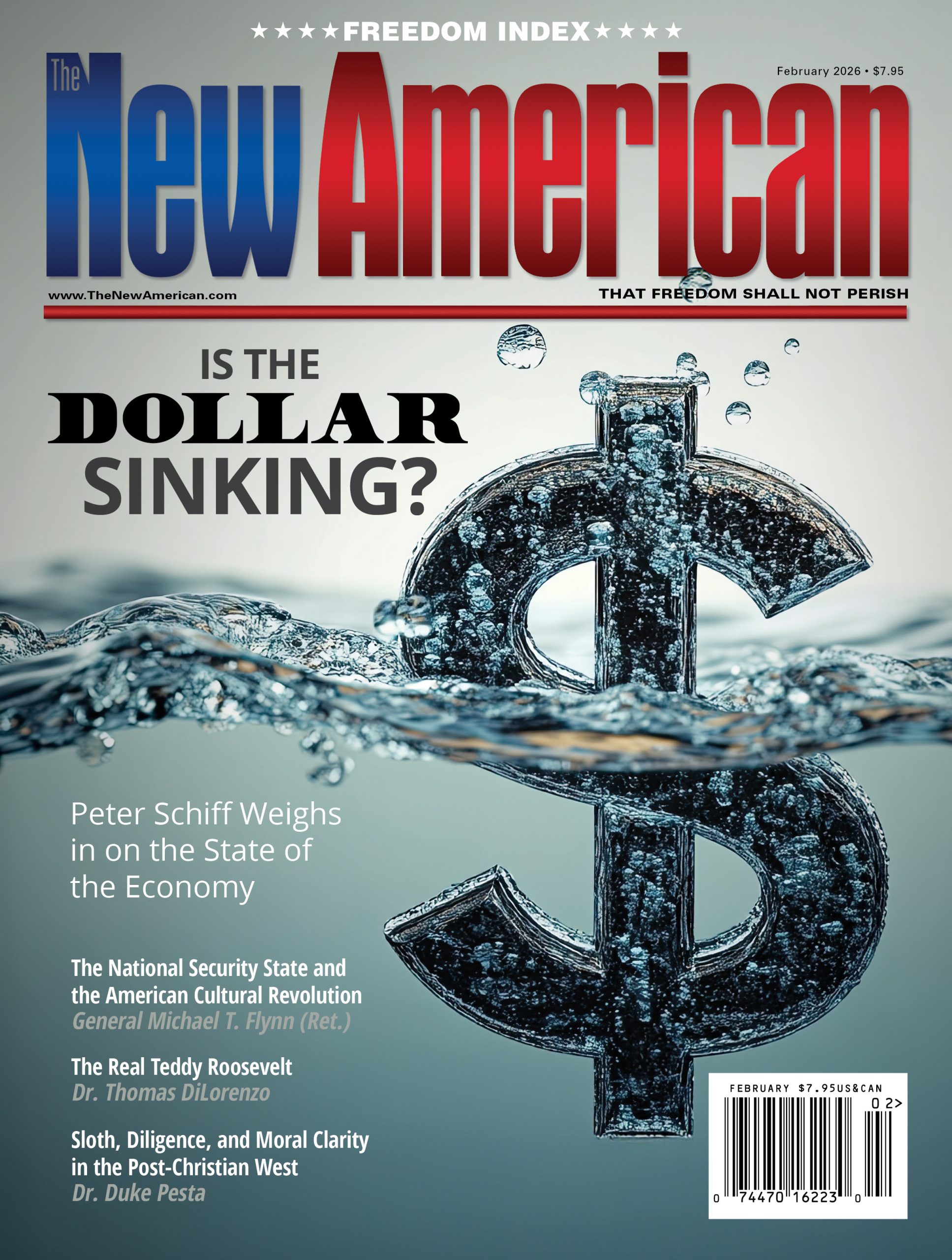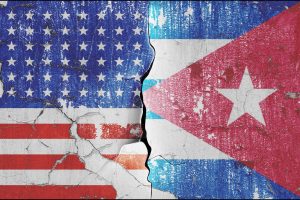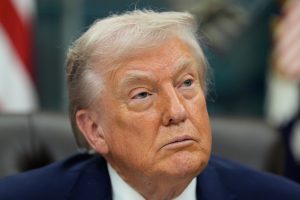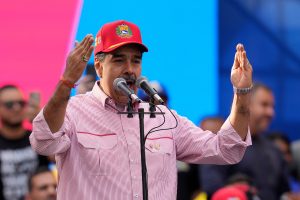
Chavez Threatens Banks and Land Owners Refusing His Orders
The Venezuelan ruler has already taken over around a dozen banks and directly controls almost a third of the nation’s banking sector. Millions of acres of farmland have also been seized by the regime and redistributed to build collective farms, resulting in a dramatic decrease in agricultural production which has forced the once relatively prosperous nation to import increasing quantities of food.
But Chavez blames the banks. During his weekly talk-show program, the self-styled “revolutionary” leader blasted some of the nation’s largest remaining financial institutions. He accused them of failing to comply with a rule purportedly forcing all banks to dedicate at least 10 percent of their lending to the government’s projects — mostly state-controlled agricultural initiatives.
“The private banks that do not comply with the constitution and their duty, well, I do not have any problem nationalizing them,” Chavez roared. “We must ensure the constitution and laws are complied with!”
The Venezuelan regime has become increasingly authoritarian over the last 10 years of Chavez’s reign, expropriating industries, land, and more from their rightful owners — driving out foreign investment and productive capital in the process. The effects have been disastrous.
As the nation’s economic system continues to crumble, the socialist leader has taken to imposing price controls and other counterproductive measures — all while blaming “capitalists” and the “Yankee Empire” for his troubles. His “solutions,” meanwhile, have only further damaged the already-fragile economy.
Chavez took aim at three banks in particular — Banco Mercantil, Banesco, and Banco Provincial — ranting about their supposed favoritism of the rich and their alleged failure to obey the regime’s economic dictates. “If you can’t do it, give me the banks,” he was quoted as saying during the show as his minions in the audience cheered.
While Chavez assured that he would compensate the seized banks’ owners in case of nationalization, past expropriations have extorted property owners and businesses out of nearly all their wealth with little to no proper compensation. The victims usually have no remedy.
“Banks of Venezuela, private and public, either you finance agricultural production or we will take measures,” Chavez threatened during his show. “There is no alternative.”
While his fuming about uncooperative banks took center stage, the self-described socialist renewed his calls to increase land seizures, too. “We must advance quicker with the recuperation of land,” Chavez declared, prodding his supporters at the state and local level to seek out more property suitable for confiscation.
The government began seizing land in 2002. By 2007, over three million acres had been confiscated — with more than few deaths along the way. Chavez has taken to building “utopian” villages on the seized property for state-supervised peasants to occupy.
Industries, oil rigs, factories, media companies, and more were all targeted as well. By 2009, the Venezuelan government had seized the nation’s rice processors. And by then the collapse of the economy was in full swing — the government could not even keep the electricity on in the capital, Caracas, despite massive oil revenues from the state-owned sector.
Finally, as inflation spiraled out of control, the regime blamed free markets and the “bourgeoisie” as Chavez imposed official price controls late last year. “This is a law to protect the people from capitalism,” he boasted after announcing the decision. “I’m at the front of this operation, and we’re going to occupy factories and companies. We’re going to nationalize what needs to be nationalized.”
Meanwhile, in what observers called an astute move, the Chavez regime finalized its repatriation of Venezuelan gold reserves from around the world this week. The government ordered institutions holding the regime’s precious metals around the world to return them to Venezuela last year even as it nationalized domestic mining operations.
Central bank boss Nelson Merentes spoke with reporters after the final delivery came in Tuesday, guarded by military personnel. He explained that during periods of “global financial crisis and turmoil in the developed economic centers, gold becomes one of the principal safe assets because it is the only means of international payment that has its own intrinsic value — in other words it is not a debt of other countries.”
Chavez, who styles himself a leader in the march toward “21st century socialism,” is hardly an isolated madman within Latin America. His allies include socialist strongmen throughout the region, from Ecuador and Bolivia to Cuba and Nicaragua.
Governments perceived as more “moderate” — especially the Brazilian government led by admitted former communist terror leader Dilma Roussef — are also on excellent terms with the “revolutionaries” sweeping into power over the last decade. They also have powerful allies outside the region, too.
The collectivist leaders work tirelessly behind the scenes through organizations such as the Foro de Sao Paolo, a group founded by communist despot Fidel Castro, former Brazilian President Inacio “Lula” da Silva, the Sandinistas, as well as a consortium of Marxist terror organizations and drug traffickers. The shadowy alliance has grown to include political parties ruling most Latin American nations.
In public, meanwhile, governments in the region are pursuing “integration” through vehicles such as the Union of South American States (UNASUR) and the Community of Latin American and Caribbean States (CELAC). The development of a common currency and a joint regional military force is already well underway.
Of course, strong opposition to the collectivist machinations in the region still exists despite the efforts of Chavez and other leaders to quash it by all means possible — jailing critics, seizing their companies, rigging elections, and worse. But if the march toward “21st-century socialism” proceeds much further, the future of that resistance and the whole region could be in jeopardy, according to experts.
Related articles:
Resurgent Communism in Latin America
Price Controls, Hugo Chavez, and Venezuelan Poverty
Socialist Chavez Set To Rule Venezuela By Decree
Chavez Regime Nationalizes U.S. Oil Rigs
Socialist Chavez Arrests More Critics
Chavez Expropriates Private Property in Venezuela
Chavez: Capitalism May Have Ended Martian Life
New Americas Group Includes Cuba, Not U.S; China Cheers
Chavez Regime’s Drug Trafficking Back in Spotlight
Hugo Chavez Blames Bad Weather on Capitalism
Chavez Regime Steps Up Attacks on Opponents
Chavez Wins Referendum, Seizes Rice Processors
Corrupt Venezuelan Election Still a Blow to Regime
Freedom Activist Arrested in Venezuela on False Charges
Murder Out of Control in Venezuela
South American Union Selects Socialist Leaders
Olavo de Carvalho on Communism in Latin America
Russia-Venezuela Deepen Military, Nuclear, Economic Ties
Venezuela Targets Pharmaceutical Patents
Photo: Venezuela’s President Hugo Chavez speaks during incoming Defense Minister Gen. Henry Rangel Silva’s swearing-in ceremony at Fort Tiuna military base in Caracas, Venezuela, Tuesday, Jan. 17, 2012.




